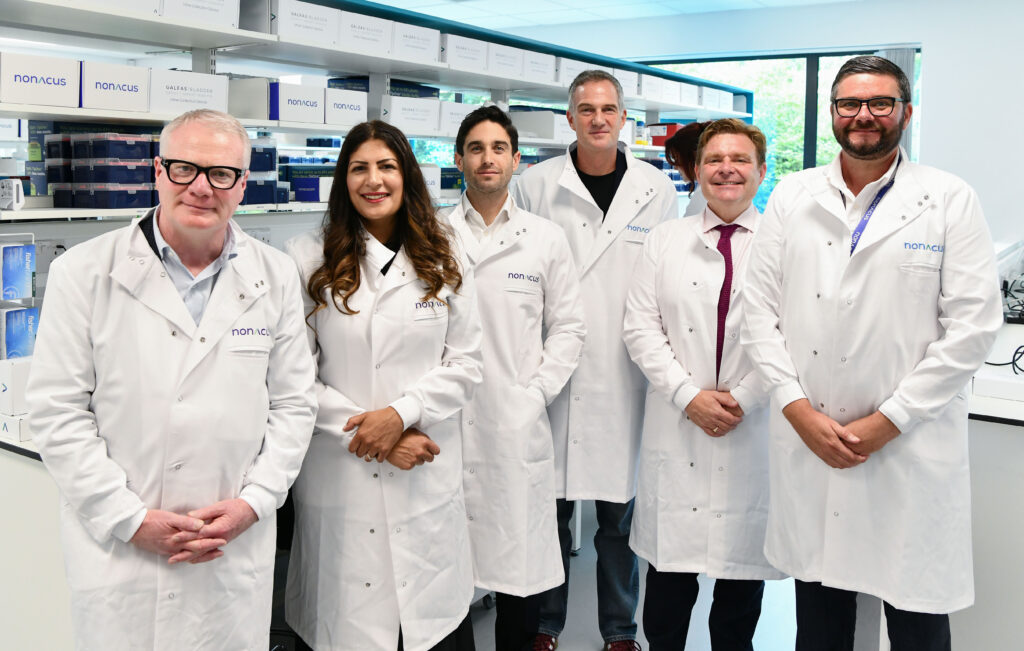Nonacus, the University of Birmingham and Cancer Research UK invest £5m in bladder cancer trials

Pictured left to right: Richard Parker, Mayor of the West Midlands, Preet Kaur Gill, MP for Birmingham Edgbaston, Jeff Bousfield, CEO of Nonacus, Peter Kyle, Secretary of State for Science, Innovation and Technology, John Cotton, Council Leader and Lee Silcock, Co- Founder and Chief Product Officer of Nonacus.
Birmingham, 15th August – Birmingham-based early cancer testing company, Nonacus, has invested in two West Midlands-based trials of an at-home urine test to prove its effectiveness in detecting bladder cancer, which affects more than 100,000 people in the UK.
West Midlands Mayor, Richard Parker, and Science and Technology Secretary Peter Kyle MP, visited Nonacus to see how its innovative tests are changing lives and supporting the NHS.
The trials use the Galeas Bladder genetic test, which a previous study—funded by Cancer Research UK and the Medical Research Council—found to accurately and consistently detect bladder cancer from a urine sample.
Galeas Bladder uses highly sensitive liquid biopsy technology developed by Nonacus in conjunction with a panel of biomarkers developed by researchers the University of Birmingham’s Bladder Cancer Research Centre. The test has been available for Bupa members since 2023.
If these trials are successful, Galeas Bladder could be used to reduce the amount of invasive hospital-based cystoscopies required to determine the initial presence of cancer, and its recurrence following-treatment. This frees up hospital capacity, speeds up result delivery and improves the experience for many patients. Over 70% of patients with non-muscle invasive bladder cancer see a recurrence of the disease.
The first trial is led by Professor Rik Bryan and Dr Doug Ward from the University of Birmingham’s Bladder Cancer Research Centre. The second trial will be led by seven NHS Trusts, four of which are Midlands-based. Combined, these trials will assess 5,000 patients at risk of bladder cancer.
Peter Kyle, Secretary of State for Science, Innovation and Technology, said: “In a region renowned for engineering, with Richard Parker as Mayor, the West Midlands is setting the pace for medical technology.
“Nonacus’ innovative approach to testing for bladder cancer will help save patients time and the NHS money.
“Life sciences is a growth sector for the West Midlands and the UK as a whole combining the power of our universities, the creativity of our businesses and the strength of our NHS.“
Richard Parker, Mayor of the West Midlands, highlighted “Health-tech is about better care for patients, shorter waiting times and more good jobs here in the West Midlands. Through my Growth Plan we are making this one of the best places in the country to develop and roll out new treatments – from expanding our innovation clusters to supporting local medtech businesses to grow and export. The technology I’ve seen today is proof that when we back science, patients and the economy both win.”
Tony Hickson, Chief Business Officer of Cancer Research UK, said: “As funders of much of the world-class, cutting-edge cancer research happening in the UK, we offer unique opportunities to commercial partners looking for early involvement in new discoveries. Having Nonacus on board to help transform promising findings in the lab into a new non-invasive test to diagnosis bladder cancer is a testament to how commercial collaborations have the potential to transform the lives of patients. We are looking forward to seeing the next steps as the test is developed and rolled out to the UK and beyond.”
Jeannie Rigby, CEO of Action Bladder Cancer, said ” Bladder cancer can often be diagnosed late and has a high level of recurrence – which can lead to poor outcomes for patients – and bladder cancer has been neglected in terms of new research in the past. Action Bladder Cancer UK, bladder cancer patients and their families, welcome this exciting development in improving testing for bladder cancer.
Professor Rik Bryan, Director of the Bladder Cancer Research Centre at the University of Birmingham, shared “These trials are the culmination of eight years of collaborative research and development between the University of Birmingham and Nonacus, which has the potential to help the millions of patients at higher risk of bladder cancer across our country and worldwide.”
Jeff Bousfield, CEO of Nonacus, commented “Our investment reaffirms the West Midlands as a leading region for trialling new and life-saving innovations and reflects our confidence in the Mayor’s focus on health tech for better patient care, and the Government’s Life Sciences Sector Plan, to safely and effectively bring Galeas Bladder to the 100,000 plus UK patients that could benefit.”